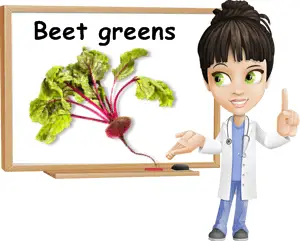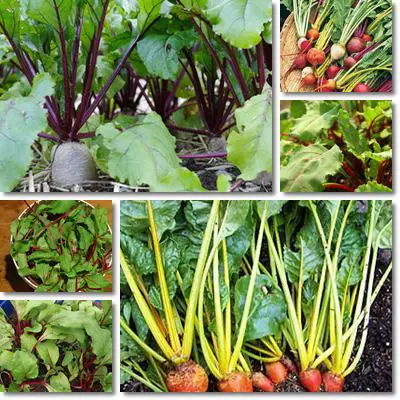Beet greens are the leafy tops of the beetroot plant (Beta vulgaris) and an amazing source of important nutrients such as vitamins A, K and C, not to mention a variety of other health-friendly dietary minerals and antioxidants. According to research, consuming green leafy vegetables such as beet greens is highly beneficial for our eyesight, bone and cardiovascular health, not to mention it encourages a natural detoxification process within our body.
Even more, green leafy vegetables such as beet greens are believed to help protect against various cancer forms thanks to their generous antioxidant and anti-inflammatory compounds.
What do beet greens look like?
Beet greens are the leafy tops of the beetroot plant. They are large, dark green leaves with visible crimson red veins, attached to meaty vivid red or deep purple stems. Beet leaves have an unappealing, rough and wilted-leaf appearance, hence their lack of popularity.

What do beet greens taste like?
Raw beet greens have a chewy, rough texture and bitter taste. Cooked leaves tend to soften significantly and become tender and easy to chew. As far as taste is concerned, cooked beet greens taste like greens. They have a characteristic rich, leafy green taste, similar to kale or spinach. Their flavor is mild and cooking them even for short periods of time gives them a slightly sweet aftertaste. Like most greens, beet greens take kindly to seasoning.
About cooking beet greens
Garlic, olive oil, vinegar, a bit of salt and pepper, cream, grated Parmesan or other dry cheeses go wonderfully with beet greens. You can sauté, steam, blanch, fry or juice them. They are great sprinkled with salt and baked as vegetable chips, but also take front stage in salads due to their rich, green taste. They also go well in omelets with goat cheese and tomatoes or mixed with whole-grain pasta and grated Parmesan. They even make a delicious pizza topping together.
What are beet greens good for?
Aside from being an incredibly versatile leafy vegetable, beet greens hold many health benefits as well. Here are 10 impressive nutrition facts and health benefits of beet greens:
Excellent source of vitamin K
100 g of fresh beet greens provides us with 400 mcg of vitamin K, about 5 times the daily requirement of an adult. Vitamin K is responsible for calcium absorption in bones and thus contributes to bone integrity and bone health. Moreover, it lowers inflammation markers in the body, supports blood coagulation processes, prevents bleeding and reduces oxidation stress, protecting cells and DNA from potentially cancerous mutations.

Great for eyesight
Beet greens are a wonderful source of vitamin A and provitamin A antioxidants such as lutein and zeaxanthin. While the vitamin A content of beet greens contributes to healthy eyes and good eyesight, the antioxidants lutein and zeaxanthin protect the retina from harmful radiation from the sun.
Improve cardiovascular health
Thanks to their high vitamin K content, beet green prevent arterial calcification (abnormal calcium deposits on the inside of our artery walls that reduce blood flow). Moreover, they are a great source of dietary fiber (3.7 g) which reduces fat absorption and thus lowers LDL (bad) cholesterol and triglyceride levels, not mention acts like a natural laxative, relieving constipation.
Good source of vitamin C
Beet greens provide 30 mg of vitamin C per 100 g of leaves. Vitamin C not only improves immunity, but also contributes to reducing inflammation and chronic disease risks. Other nutrients found in beet greens include vitamin B6, folate, copper, calcium, potassium, phosphorus and magnesium.
Benefits for the immune system
Beet greens boost immunity thanks to a generous vitamin C and vitamin A content. Vitamin A protects the integrity of mucous membranes at the level of the eyes, nose, mouth, throat, lungs and stomach, areas directly exposed to the outside world and its pathogens, preventing any possible breach and infection. Vitamin C makes our blood cells more aggressive against pathogens from the surrounding environment, reducing healing and recovery time. Both nutrients are vital for good immunity.
Rich in antioxidants
Beet greens are rich in potent antioxidants such as vitamins A, C and K, as well as manganese, lutein, zeaxanthin and betaine (found the meaty stems and reddish veins of the leaves) which protect against cells and DNA damage, preventing cancer-causing mutations.
Boast anti-inflammatory action
Inflammation has been linked to higher risks of developing chronic disease and both vitamin K and vitamin C are potent anti-inflammatory agents. Vitamin K, for example, reduces interleukin-6 levels, a major inflammation marker.
Help manage anemia
Beets are a good source of iron and vitamin C, two nutrients of pivotal importance for iron deficiency anemia prevention, management and treatment. Iron is essential for red blood cell formation and an important component of hemoglobin, meaning it helps transport oxygen to cells and tissues and carbon dioxide back to the lungs. Not having enough iron causes the infamous anemia-related fatigue. Vitamin C improves the absorption of iron, meaning it increases its bioavailability, further contributing to anemia management and treatment.
Cleanse the body of toxins
Beet greens have been found to contain special compounds that encourage the production of glutathione, an antioxidant that binds to toxins, exerting a detoxification action on the liver.
Anticancer potential
Beet greens are rich in purple-red antioxidants called betalains such as the betacyanin betanin, antioxidant-vitamins and minerals, all of which boast anticancer activity. Betanin and other betalain pigments have been found to exhibit a cytotoxic action on cancer cells. Manganese is a co-factor for the antioxidant enzyme superoxide dismutase. Vitamin K is currently being investigated as a potential prostate cancer treatment together with vitamin C. Vitamin C is a relentless free radical scavenger, protecting cells and DNA from damage.
Conclusion
Overall, beet greens are an extremely healthy food, considerably more nutritious than beetroot in certain aspects (also see the benefits of beetroot). However, variety being the basis for good health, we should consider enriching our diet with as many vegetables as possible to have a higher chance of getting all the nutrients our body requires. And, fortunately for us, there is a wide variety of leafy greens to help us achieve it.
